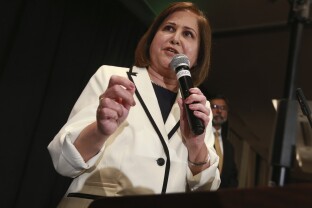Ghazala Hashmi recalls adults, many of them meeting a Muslim for the first time, asking her awkward questions like whether she believed in multiple gods or prayed to Jesus. Hashmi had just emigrated from India to a small Georgia town, one of the first two Muslim families to move to the area. She was 8.
The questions were unfair, at least for a child, but they helped Hashmi forge an identity at an early age — one that would shape her political career, she says now.
“I think it did help me to grapple with some big questions at a young age and to actually engage in an understanding and having to define myself and my identity at a young age,” she said. “I think that’s been very formative for the kind of person I became. And it is a part of my identity now, as I run for office.”
More than 50 years later, Hashmi is the Democratic nominee for lieutenant governor in Virginia. She narrowly won a six-way primary in June and is running on a ticket with Democratic gubernatorial nominee Abigail Spanberger in what is widely seen as the first big electoral tests for her party in President Donald Trump’s second term.
If she wins, the 61-year-old Hashmi would be the first Muslim woman ever elected to statewide office. And she would do so only a year after Trump, whose rhetoric and policies have targeted the Muslim community, won a new term in the White House.
She’s also running at the same time as Zohran Mamdani, the New York Democratic mayoral nominee who has faced a slew of anti-Muslim comments.
Hashmi first ran for state Senate in suburban Richmond in 2019 in part because she disliked Trump’s rhetoric about immigrants, she said. A frequent message from her campaign — “Ghazala Hashmi is an American name” — was a direct rebuttal to the notion that only certain kinds of people were true Americans. She won and has been in the state Senate since 2020.
“I really see Donald Trump as a violently reactionary figure who brings to the forefront all of the animus, the anxieties of who and what we are as a country,” she said. “He wants to define America in one context without regard to the complexity that is this country.”
Hashmi doesn’t shy away from talking about her faith or how it shapes her worldview. She said being a Muslim has a “foundational basis for how I read legislation,” informing her support for programs like ensuring health care coverage or housing for everyone.
“My faith is very simple,” she said. “You feed the hungry. You take care of the sick. You’re responsible for the care of the elderly and the young. So when you have … that kind of basic foundation for your faith and your identity, for me, I think it translates into ‘what do we as government leaders have a responsibility to do?’”
She said her political career has allowed her to continue talking to people about Islam and try to correct misperceptions about the faith, just as she did as a child in Statesboro, Georgia. She says she tells people that she never wears a hijab because no one in her family ever did, and that women in many Muslim countries are among the most educated in the world.
“I think the biggest motivation for me was to shatter those stereotypes,” she said. “Muslims have been part of American society and culture for centuries. Some of the very first slaves from Africa were Muslims, and they brought those practices and that culture and that faith to those countries. So in essence, the faith itself has been foundational to certain core structures in American society.”
In November, Hashmi faces Republican John Reid, who is running alongside current Virginia Republican Lieutenant Governor Winsome Earle-Sears. Reached for comment on this story, a spokesman for Reid reiterated a call for the two candidates to hold 10 debates across the commonwealth, which Hashmi has yet to accept.
Hashmi’s and Spanberger’s campaigns are expected to try and capitalize on an anti-Trump animus in Virginia, especially among those whose jobs with the federal government have been affected by cuts from the administration.
Hashmi’s primary victory came shortly before Mamdani won the Democratic mayoral primary in New York.
Hashmi said she knew more about Mamdani’s mother than the candidate. His mother, Mira Nair, directed the movie “Mississippi Masala,” which Hashmi said “resonated the most powerfully to my experience growing up in the South.”
But she said she admired his campaign’s energy and appeal to young people.
“I have not dug in too deeply into his politics,” she said. “But I think I think there’s a hunger for new faces and new voices, and I think he’s resonating with, in particular, a lot of young folks.”
Sign in
Log into your free account with your email. Don’t have one?
Check your email for a one-time code.
We sent a 4-digit code to . Enter the pin to confirm your account.
New code will be available in 1:00
Let’s try this again.
We encountered an error with the passcode sent to . Please reenter your email.


